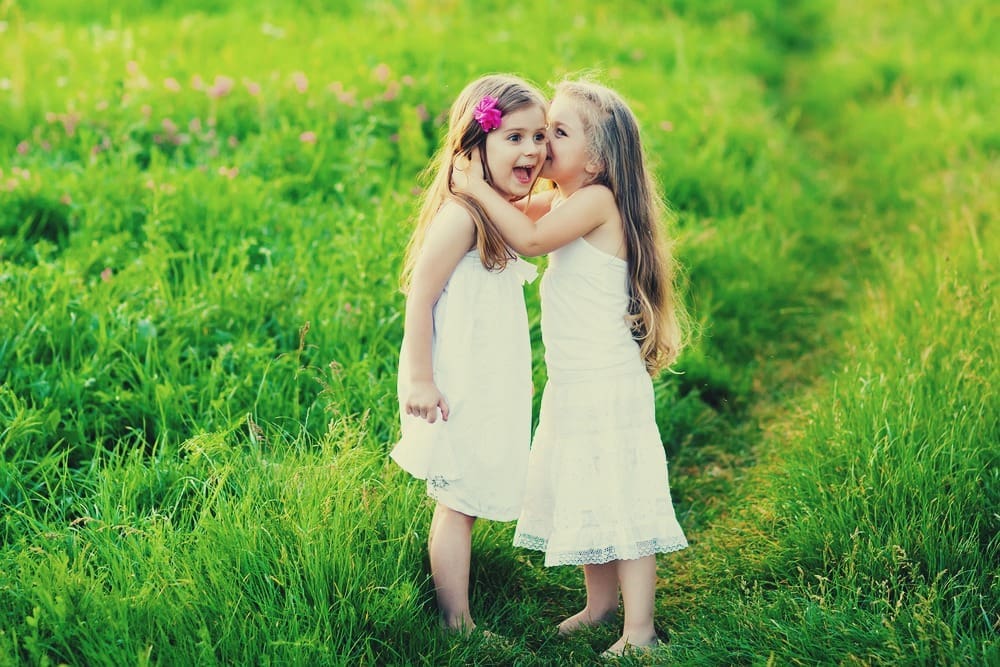School is back in session, and families are settling into routines. Children are back in the classroom, reuniting with friends, meeting new people, and getting used to their new social environment. During these early months of school, it’s not uncommon for certain dynamics to cause challenges for young children.
Typically this happens in less-supervised areas, like the playground. It’s common for children to come home and tell their parents things like:
- “I was told there wasn’t enough room for me to join the game all the other kids were playing at recess.”
- “A boy in my class keeps punching me at lunch when he thinks nobody is looking.”
- “A girl in another class keeps calling me names in front of my friends, and I hate it!”
But there’s good news: Parents can help their children navigate day-to-day playground politics by teaching them social-emotional skills—such as empathy, emotion management, and problem-solving.
Building Social Emotional Skills to Deal with Playground Politics.
Empathy
Empathy helps children understand or feel what another person is feeling by putting themselves in the other person’s shoes. Empathy can also help create self-awareness that allows children to distinguish their feelings from the feelings of others.
How to Teach Empathy to Kids
The most powerful way to encourage empathy is to model it. For example, when your child is hurt, disappointed, frustrated, or has a strong emotion, you might model showing empathy by saying, “Oh no, you sound sad…” or “It’s so hard to leave the park when you’re having so much fun, isn’t it?” or “Uh oh, what happened?”
You can also foster empathy in your child by discussing scenarios in which it could be used. For example, you could talk with your child about how another person might feel if he or she were to see someone get hurt on the playground or in response to something that happens to a character in a book or movie.
Emotion Management
Emotion management refers to a person’s ability to control his or her emotions in response to arousing situations.
How to Teach Emotion Management to Kids
Two of the most important skills we can teach children are how to identify their feelings and how to self-soothe when they are experiencing a strong emotion. These skills take time and practice to develop. Positive self-talk and deep breathing are two emotion-management tactics commonly used and practiced with children. Teaching self-talk encourages kids to talk to themselves in a quiet voice or inside their heads. Some examples are: “I need to take three breaths,” “I can do this if I practice more,” “I’m not going to let her get to me,” “That was probably an accident,” or “My mom still loves me, even when I mess up.”
Deep breathing is an effective way to connect the body and the mind in order to move from a fight-or-flight response to problem-solving. The “Flower Breath” is a simple breathing method kids can use. Ask your children to imagine smelling a beautiful flower, breathing in through the nose and breathing out through the mouth, and releasing any stress, strain, or emotion they might be feeling as they exhale.
Problem Solving
Teaching problem-solving means helping kids learn to recognize a social problem, focus on finding solutions, predict consequences, and select a safe and respectful solution.
How to Teach Problem Solving to Kids
When challenges arise with other children, ask your children a series of questions to help them think through the problem. Eventually they’ll be able to ask the questions for themselves. Questions to consider when teaching problem solving are:
• “What happened?”
This allows each child to tell his or her story and feel heard before solutions are brainstormed.
• “How did that feel?”
Helping kids get clear about how they feel will help clarify what they actually want or need.
· • “What did you want/need?”
Many times we can read situations inaccurately. Asking this question helps focus the brainstorming solutions.
• “What are other ways to get what you want/need?”
Let your children brainstorm two or three ideas. It’s okay if they’re not all great ideas! This is just brainstorming. If they can’t come up with ideas on their own, offer them two choices that align with your family’s values.
• “How would that work for you?” or “What will happen if you try …?”
This is an opportunity to evaluate each of the proposed solutions.
• “What are you going to do now?” or “What will you try next time?”
By asking this question, you allow your child to choose how to act differently next time. Expressing a future action out loud increases the likelihood your child will try it.
Managing social dynamics in a school setting can be very stressful for children and their parents. Social-emotional skills can help children de-escalate a conflict, advocate for themselves, and find more acceptable, safe, and socially appropriate ways of getting their needs met when they may be feeling bullied or dismissed.
About the Author: Melissa Benaroya
 Melissa Benaroya, LICSW, is a Seattle-based parent coach, speaker and author in the Seattle area (MelissaBenaroya.com). She created the Childproof Parenting online course and is the co-founder of GROW Parenting and Mommy Matters. Melissa provides parents with the tools and support they need to raise healthy children and find more joy in parenting. Melissa offers parent coaching and classes and frequently speaks at area schools and businesses. Check out Melissa’s blog for more great tips on common parenting issues and Facebook for the latest news in parent education!
Melissa Benaroya, LICSW, is a Seattle-based parent coach, speaker and author in the Seattle area (MelissaBenaroya.com). She created the Childproof Parenting online course and is the co-founder of GROW Parenting and Mommy Matters. Melissa provides parents with the tools and support they need to raise healthy children and find more joy in parenting. Melissa offers parent coaching and classes and frequently speaks at area schools and businesses. Check out Melissa’s blog for more great tips on common parenting issues and Facebook for the latest news in parent education!


I love these questions!! I’m searching for how to help kids during recess or lunch when they run into challenges with each other.
Thank you very much for your recent articles,
question need to be answered that Is there any relationship between Anxiety and coldness on legs.
Thank you
Anxiety can cause more general changes in body temperature, but it would be worth getting this particular symptom checked by a doctor to make sure there is nothing else that might be causing this.
No cold legs are to do with blood vascular nature and body temperature regulation and feed back, and anxiety is just a disproportionate fear to a stimulant or aggression that the fore brain, primitive fore brain and other primitive behavior regulatory mechanisms allow the individual to experience.
However proverbially and colloquially only by language,they have been associated as in sayings of ” he/ she has the jitters and cold feet.”
My grandfather used to tell me, and I’m Indian myself that Sanskrit and Hindi or even Japanese or other old world texts had words for every associated psychological feeling that English a mixed derived language ( which is of course easy today) lacks to describe. It’s why proverbs a group of words to make phrases have to describe one feeling.
Helpful tips, thank you!